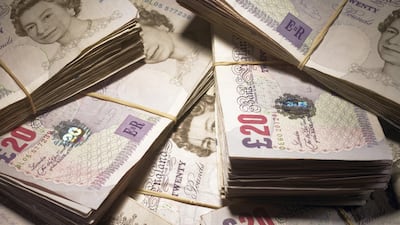The Bank of England has been urged to investigate where £50 billion ($67.21bn) in “missing” cash is stashed, according to a government committee, which is concerned the money is being used by criminals.
The Public Accounts Committee (PAC) said the money, equivalent to a stack of £5 notes more than 1.2 kilometres high, has gone astray because the bank does not effectively monitor cash usage in the country.
Meg Hillier, chair of the PAC, said the lender did not seem curious as to where the £50bn in notes “or about three-quarters of this precious and dwindling supply, is stashed,” nor who it is stashed by and what for.
The National Audit Office (NAO) first highlighted the issue in September and with the missing cash not being used in transactions or held as savings, there are concerns it may be overseas, stored in private homes or being used in for illegal activities in the “shadow economy”.
The PAC said the regulator has been behind the curve in ensuring access to cash for consumers and businesses at a time when there is real concern over the implications of Britain moving towards a cashless society.
“[The BoE] needs to be more concerned about where the missing £50bn is,” said Ms Hillier, “Depending where it is and what it’s being used for, that amount of money could have material implications for public policy and the public purse. The bank needs to get a better handle on the national currency it controls.”
The BoE said its responsibility is to meet the public demand for banknotes, something it has always achieved and will continue to do so.
“Members of the public do not have to explain to the bank why they wish to hold banknotes. This means that banknotes are not missing,” a spokesperson said.
The use of cash is declining in the UK, with Covid-19 accelerating the shift, causing a 71 per cent drop in demand for notes and coins from ATMs between March and mid-April at the height of the pandemic, according to the NAO.
Some businesses now refuse to accept cash payments to help curb the spread of Covid, while consumers increasingly prefer digital payments to avoid contact with notes and coins.
In September, the UK's Royal Mint said it would stop producing 2 pence and £2 coins for at least 10 years as demand for cash dwindles and a coin mountain lies in storage.
However, the declining use of cash is an issue for sections of society reliant on the payment method, including more than a million UK adults who do not have a bank or building society current account.
Consumer champion Which? said the rapid move towards a cashless society risks excluding the most vulnerable who still depend on it to pay for essential products and services.
“With the pandemic putting additional strain on the UK’s already frail cash network, the government must urgently introduce its promised legislation to ensure consumers have local access to cash for as long as they need it,” said Gareth Shaw, head of money at Which?
The PAC argue that although the use of bank notes is in decline, demand has steadily gone up, hence its concern over the missing money.
The BoE does not “appear to have a convincing reason for why the demand for bank notes keeps increasing”, it said in report.
However, the committee acknowledge that the rising demand is a trend seen in other major currencies, including in the dollar and euro, with only about 15 per cent of the US dollar supply accounted for, a significantly lower proportion than for Britain.
The BoE said the increase in the value of banknotes in circulation has increased this year because more people are hoarding cash during the pandemic.
It estimates that 20 to 24 per cent of issued notes are used or held for cash transactions. This leaves about £50bn being used for other, unknown purposes.


